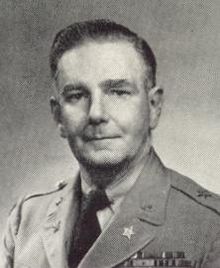Robert A. McClure
Robert Alexis McClure (born March 4, 1897 in Matton , Illinois , † January 1, 1957 in Fort Huachuca , Arizona ) was an American military man and a specialist in psychological warfare .
McClure graduated from the Kentucky Military Institute in 1915 . He joined the Philippine Constabulary (PC), a paramilitary American police force in the Philippines , before joining the United States Army in 1917 . Until the beginning of the Second World War he served 17 years in various infantry and service units in China and the USA.
Life
Second World War
In 1941 McClure became a brigadier general and military attaché of the American embassy and nine other governments in exile in London. In September 1942 Dwight D. Eisenhower appointed him head of the AFHQ's intelligence agency for the European Theater (ETOUSA).
As part of Operation Torch , he was in North Africa in December of the same year and established the Information and Censorship Section with 1,500 employees. McClure brought together military and civilian personnel from the United States Office of War Information , Office of Strategic Services , US Army (Psychological Warfare Branch) and the British Political Warfare Executive .
With the conclusion of the campaigns in North Africa and Sicily, Eisenhower appointed him director of the Psychological Warfare Division (PWD) of the SHAEF . After the end of the war, McClure headed the PWD, which was restructured into the Information Control Division , for the purpose of media control in the American zone of occupation . In the summer of 1948 he returned to the USA in a similar capacity. Now he was head of the Civil Affairs Division in the New York Field Office for reorientation and education of the populations in the occupied countries of Germany, Austria, Japan and Korea. His supervisor was Daniel Noce , chief of civil affairs in the United States Department of Defense , who ran the military governments in the occupied countries. As in the ICD Germany, McClure divided his unit into the departments of press, magazine, film, radio, theater, music, art, exhibitions, libraries and publishing rights.
In the early days of the Cold War, McClure was in charge of the so-called " Operation Iwan ", which aimed to find clues for internal Soviet propaganda through intensive study of Soviet life .
Cold War
After the war, McClure became head of the intelligence control department of the American military government of Germany, where he should now work out strategies to win the Russian people according to the interests of the United States.
In addition to this activity, McClure worked on the re-establishment of the PWD in the wake of the emerging Cold War , which was only granted to him at the beginning of the Korean War . Following his recommendation and with him as chief, the US Army now founded a PWD from the staff of the former Psychological Warfare Division , which was renamed OCPW (Office of the Chief of Psychological Warfare) in 1951. One of the three established divisions, the special operations , later became the Green Berets , which Aaron Bank and Russell Volckmann shaped from the beginning.
In 1952, under McClure's guidance, the School of Psychological Warfare was established at Fort Bragg, North Carolina , where he also established the 10th Special Forces Group .
The CSA J. Lawton Collins , who had been occupied with special tasks for too long, appointed him head of the American military mission in Iran in 1953 , where he established close contacts with the Shah Mohammad Reza Pahlavi and his military. As promised, Collins promoted him to major general before retiring in 1956. McClure died of a myocardial infarction . He was close friends with Charles Douglas Jackson .
References
Web links
- Major General Robert Alexis McClure: Forgotten Father of US Army Special Warfare , Colonel Alfred H. Paddock, Jr., www.psywarrior.com
Individual evidence
- ↑ a b Dealing with Russians . In: Der Spiegel . No. 47 , 1950, pp. 18 ( Online - Nov. 22, 1950 ).
| personal data | |
|---|---|
| SURNAME | McClure, Robert A. |
| ALTERNATIVE NAMES | McClure, Robert Alexis |
| BRIEF DESCRIPTION | American soldier and specialist in psychological warfare |
| DATE OF BIRTH | March 4, 1897 |
| PLACE OF BIRTH | Matton , Illinois , USA |
| DATE OF DEATH | January 1, 1957 |
| Place of death | Fort Huachuca , Arizona , USA |
